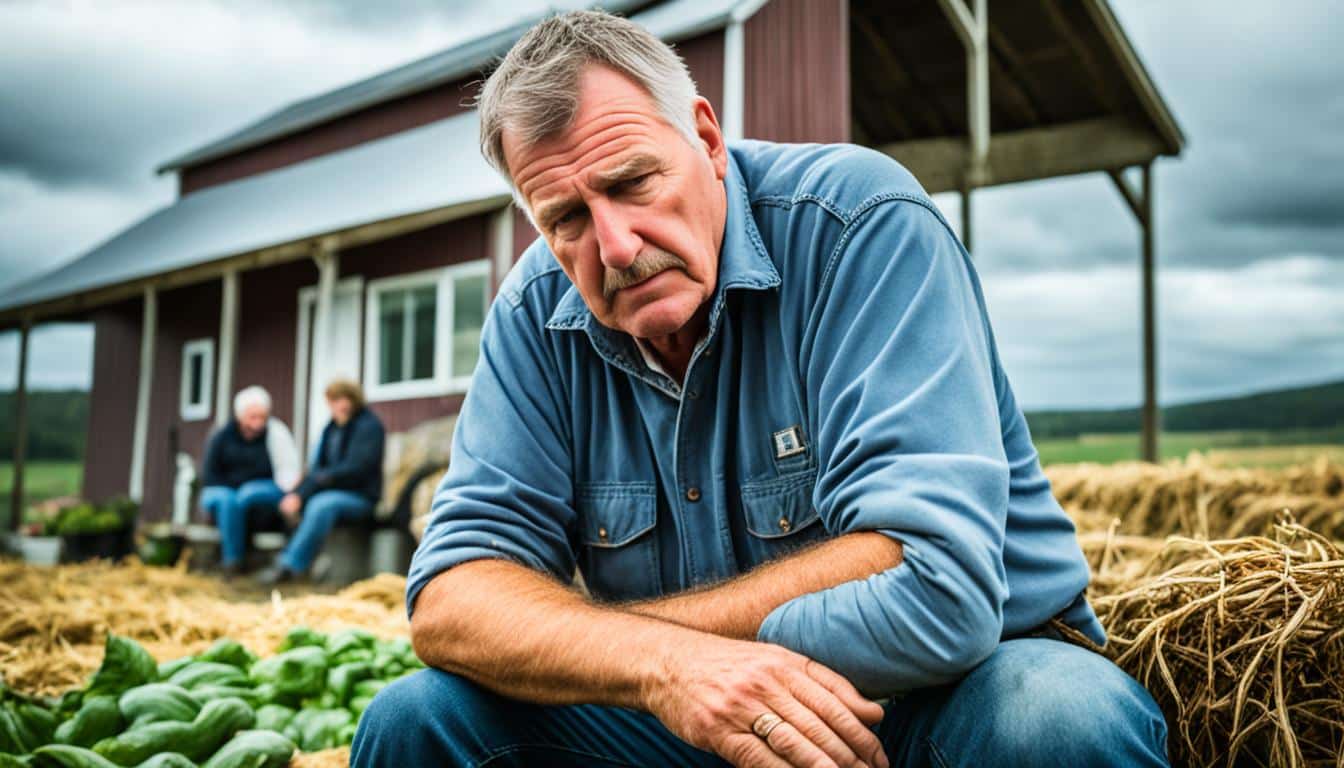Menu

Did you know that the ratio of physical, behavioural, emotional, and relationship symptoms linked to unhealthy stress in farm professionals can be overwhelming? The farming industry has unique challenges that deeply affect farmers’ mental health. They face pressure from managing crops, dealing with the weather, and market ups and downs. Farmers’ mental health is crucial, as much attention should go to them as to their farms.
During difficult times like these, farmers not feeling well mentally need to know they’re not alone. Help is out there from emergency services, mental health experts, and special hotlines. Important resources for them include the National Suicide Prevention Lifeline at 1-800-273-TALK (8255). They can also text TALK to 741-741 for the Crisis Text Line. The Substance Abuse and Mental Health Services Administration (SAMHSA) National Helpline is also available at 1-800-662-HELP (4357).
The agricultural sector is called to come together, with a crucial message of ‘Stronger Together’. Addressing mental health supports not only individual well-being but also helps farms be sustainable and productive. Recognising mental health support’s importance during emergencies is key to a strong and successful farming community.
In the farming community, mental health is vital and often overlooked. Addressing it is key for farmers’ health and their farms’ futures. This piece will explore the importance and dire effects of ignoring mental health.
Farmers need tailored mental health support due to the challenges they face. Studies show that people in the countryside are more likely to suffer from mental illnesses. These include stress, depression, and anxiety. Mental health issues can harm farm productivity and safety.
Accessing rural mental health services is crucial. They help farmers cope with stress and improve their mental well-being.
Ignoring mental health has serious consequences. In 2016, U.S. farmers’ suicide rates were much higher than other working males. This can lead to more substance use, conflicts, and accidents on the farm. The COVID-19 pandemic has made this worse.
Recognising signs of stress and seeking help is essential. Hotlines and online directories offer vital farm stress support. They are key to maintaining the well-being and sustainability of farmers’ lives.
Statistics show that stress, depression, and anxiety are common among agricultural workers, highlighting the urgent need for accessible mental health resources.
Knowing the signs of stress and mental health issues is vital. These issues can show up in many ways. By spotting these signs early, we can help with mental health on farms quickly.

On a farm, stress might make your heart race and your neck ache. You could feel sick to your stomach or tired all the time. Watching for these early signs is crucial.
Over time, stress can cause more serious health problems. These might be headaches, ulcers, or back pain. These issues can signal deep stress problems on the farm.
Stress can also affect you emotionally. You might feel anxious, hopeless, or easily irritated. For farm families dealing with tough times, spotting these feelings is key.
Changes in behaviour can show someone is stressed. This might be using more alcohol or drugs, finding it hard to decide, or neglecting animals. Services like the FirstLink Help Line and Together Counselling can help with farm stress.
Stress can harm relationships, affecting family and friends. If these bonds seem strained, it could point to serious mental health issues. Look out for things like less activity or signs that someone might be thinking about suicide, like feeling hopeless or withdrawing. Recognising these signs ensures farms can support mental health effectively.
During a farm emergency, dealing with mental health quickly is essential. A survey in 2021 showed over half of farmers and workers had more mental health problems. So, knowing how to get help fast is very important.
Signs of stress on the farm include more accidents from tiredness, the farm not looking its best, and less joining in community events. Seeing these signs early can lead to getting help right away.
There are several places where farmers can turn for help during tough times:
| Resource | Role |
|---|---|
| Farm Aid | It offers a hotline (1-800-FARM-AID) for instant help. |
| National Suicide Prevention Lifeline | It provides 24/7 help at 1-800-273-TALK (1-800-273-8255). |
| Togetherall | It’s a private online place where licensed therapists help out. |
| Rural Resilience Training | It gives free courses on understanding stress, how to talk, and spotting signs early. |
| Michigan State University Extension | It shares ways to manage stress, handle grief, and be stronger in the farming community. |
Getting help from these places quickly is key to stopping farm problems getting worse. It highlights the need for farmers to know where to look for mental health help. This ensures they can act fast in an emergency.
In a crisis, making plans for before, during, and after is crucial. This means having everything from hotlines to apps that care for farmers. Better access to help, more people to support you, and educating the community can make a big difference.
In the end, farms are stronger when everyone looks out for each other and helps when needed. This builds strength and keeps people and their loved ones well in the long run.
During a mental health crisis, quick and right steps are vital. Rapid mental health aid can save lives. That’s why knowing what to do is key.

In a mental health crisis, reach out to emergency services fast. Use numbers like the National Suicide Prevention Lifeline (1-800-273-TALK) or text TALK to 741-741 for the Crisis Text Line. They are always available to give you immediate help. These services can connect you with trained counsellors promptly.
Quick help is found in healthcare settings like primary care, walk-in clinics, or the ER. These places can offer fast help to anyone feeling really down. It’s crucial to know these options, especially in rural areas with fewer mental health experts. Farmers can also call the Iowa Concern Hotline (800-447-1985) if they need emergency mental health support.
Getting to these resources fast is very important. For example, the Illinois Warm Line is ready to help by phone (1-866-359-7953) or text (1-866-880-4459) on weekdays. Having these emergency services at hand means quick care for stress or mental health problems.
| Resource | Contact Information | Availability |
|---|---|---|
| National Suicide Prevention Lifeline | 1-800-273-TALK | 24/7 |
| Crisis Text Line | Text TALK to 741-741 | 24/7 |
| Illinois Warm Line | 1-866-359-7953 (Phone) | 8am-5pm, Mon-Fri |
| Illinois Warm Line | 1-866-880-4459 (Text) | 8am-5pm, Mon-Fri |
| Iowa Concern Hotline | 800-447-1985 | 24/7 |
These resources help make sure farmers and anyone in a mental health crisis can get swift, crucial care. They show how crucial mental health emergency response and services are.
Setting up a strong mental health strategy for farmers is crucial. This helps keep them well for a long time. Long hours and tough work can take a toll on those in farming. So, ongoing support is key for the industry to thrive.
Creating a long-term support network is vital. Farmers need to connect with people they trust, like family and friends. They should also join local groups. This support system offers them both emotional help and useful advice, easing their stress.
It’s essential for farmers to use stress management techniques. Things like simple exercises, meditation, and planning can really help. They not only improve mental health but boost productivity too.
Having regular check-ups for mental health is also crucial. Just like with your body, checking in with a professional can catch issues early. This helps stop stress from building up and keeps mental health strong.
| Statistic | Details |
|---|---|
| 51% of farmers | Reported experiencing stress, anxiety, depression, and resilience in a study conducted in Canada. |
| 1.5 times higher suicide rate | Farmers compared to other occupations, according to data from the National Violent Death Reporting System. |
| 57% of farmers | In Iowa and Colorado reported depressive symptoms and risk factors. |
| Suicide rate 43.2 per 100,000 | Among male farmers and ranchers in 2016, compared to 27.4 per 100,000 for male working aged adults across all occupations. |
In tough times, it’s vital for farmers to know where they can get help for their mental health. They deal with unique struggles, so getting support quickly can really change things. Here, you’ll find some important resources for farmers during tough times. These can provide help right away and for the long run.
For instant help, there are hotlines and helplines just for farmers’ mental health. These services are free, private, and open all the time:

There are also many online places that offer mental health help just for farmers. These websites have guidance, lists of local help, and support from others going through similar things:
Our mental health helplines and online support make sure that farmers get the care they need. This helps them stay strong and well, no matter how hard things get.
Family and community are crucial in aiding mental health within farming communities. Their partnership offers a complete support system. This aids in the upkeep of farmers’ mental well-being.
For farmers tackling mental health issues, family talks are vital. Recognising stress or depression is essential for family members. They can then help their loved ones seek professional help quickly.
Youth in farming often battle depression, anxiety, and stress. Continuous family support and conversation are key for them.
Community efforts like wellness programs are critical for farmers. They help build resilience and a supportive network. In Australia, a 2016 study showed how community groups improve mental health among farmers over time.
The involvement in these activities boosts the whole community’s mental health. It also ensures help for families when faced with mental health crises. These combined efforts act as a powerful shield for farmers’ mental well-being.
Farmers and ranchers often deal with tough challenges. These can greatly affect their mental health. So, both the government and non-profit groups are offering special mental health help for those in agriculture. This support is vital, whether someone is in crisis or just needs ongoing help.

Local governments are tackling mental health for farmers. They’ve set up helplines that anyone can call for help 24/7. And they’re running programs to teach about stress and how to manage it. These efforts are part of a bigger plan to help with the unique stress farmers can face.
Groups like Farm Aid and AgriSafe are also on the front line. Since 1985, Farm Aid has given over $27 million in grants to 300+ organisations. They support making good food, helping farmers do well, and changing farming for the better.
For Farm Aid, support grants usually range from $5,000 to $10,000. They can offer more for big projects. To get a grant, you must be a tax-exempt 501(c)(3) organisation and report back by the next February. This kind of non-profit help gives farmers the resources they need for their projects.
AgriSafe does crisis help and education too. They aim to make sure farmers everywhere can get help when they need it. They want to solve the difference in mental health care between rural and city areas. Their work is vital in catching farmers before stress takes over.
| Organisation | Services Provided | Grant Amounts |
|---|---|---|
| Farm Aid | Support funds, educational programs, stress management | $5,000 – $10,000 average |
| AgriSafe | Crisis hotlines, educational programs, access improvement | Varies |
By pulling together help from the government and non-profit groups, the farming world is getting stronger. This way, farmers know they are not alone. They have the tools to face what their job throws at them.
Planning for your mental health is key to keeping your farm going strong. Research by the American Farm Bureau Federation shows that farming brings unique pressures. These include worries about money, farm problems, and fear of losing the farm. Over half of farmers and those who work on farms now face more mental health struggles. It’s crucial to have a solid plan for your mental well-being.
Adding farm mental wellness programs can do a lot to help. Programs like anonymous support through Togetherall or community efforts by the Rural Health Information Hub are gold. By setting up a solid mental health plan, farmers can tackle stress better. This ensures their own good health and keeps the farm running smoothly.
Success stories in farmer mental health teach us a lot. In Illinois, a 2021 and 2022 survey found almost 40% of farmers had some anxiety or depression. This is much higher than the 17% to 20% seen in the general public. Rural parts of Missouri also saw 18% more suicides than non-rural areas. These facts show how important it is to support farmers’ mental health.

In 2022, Missouri set up the AgriStress Help hotline. It’s meant to give farmers and rural communities mental health support. This hotline is a great example of many people working together to help. Also, farmers can now talk to mental health professionals over the phone or online. This makes it easier for them to get help, especially when they live far from healthcare centres.
Films like “Green Blood Red Tears” share farmer mental health success stories. These documentaries help everyone understand the challenges farmers face. They also show how farmers can get the help they need.
The Selah Carefarm in Arizona is another source of inspiration. It’s a 12-acre farm with 50 rescued animals. The farm offers activities like yoga, meditation, and art. Joanne Cacciatore founded it. She’s a counsellor who has spent 25 years helping people through trauma. The farm and its programs are a great support for farmers and show how much specialised care matters.
These success stories are more than just uplifting. They teach us about resilience and the value of good mental health care. Farmers, with the right support, can overcome mental health challenges. This not only helps them personally but also their communities and the farming sector as a whole.
In the farming community, learning about mental health is key. Many programmes exist to support those in agriculture. These resources help tackle mental health issues.
AgriShield is a platform in Canada that helps with mental health. It supports farmers in dealing with stress and other issues. The Do More Agriculture Foundation offers mental wellness resources, tailored for people in farming. Workshops like “Talk. Ask. Listen” and suicide prevention training are available. Farm Credit Canada supports these programmes.
Understanding mental wellness is critical, especially in farming. In Canada, one in five may face serious mental health challenges. Groups like the Canadian Agricultural Safety Association (CASA) and eMentalHealth.ca offer farmer mental health training. They support with tools and advice. In British Columbia, the AgSafe initiative gives free counselling and mental health support for farmers. Learning to spot and address mental health issues early can improve lives.
Rural communities face more challenges with mental health. It’s important to tackle these issues. This way, we can reduce the stigma around mental health in the countryside.

Rural people often feel like they should solve problems on their own. They may avoid getting help, seeing it as a sign of weakness. People in farming and related jobs have a higher risk of suicide. This shows we need to help them more.
Changing how people see mental health in farming areas needs real action, not just talk. The Rural Mental Health Resilience Program helps start honest conversations without fear. This and other education initiatives are key. They help people learn it’s okay to ask for help.
Families and communities can also help by being open and supportive. They should encourage everyone to care for their mental health. This support is vital to making mental health services more available in rural places.
In the farming world, keeping a good mental state is vital. This is especially true when the seasons change and money gets tight. The mix of unpredictable weather and financial worries can really affect farmers’ mental health.
The seasons’ ups and downs can really throw farmers off-balance. Take droughts, for example. They mean more work and less money, leading to higher stress. So, it’s key to plan ahead.
Diversify your income and find ways to manage stress suited to each season. Ways to relax, like meditation and staying active, are great for reducing stress. Also, knowing how climate change affects mental health can help you prepare for tough weather.
In places like Alaska, Idaho, and Oregon, mental health issues are a big problem. Farmers often struggle due to changing markets and unexpected events. It’s important to look for help when times are hard. Seek financial aid programs, advice from experts, and support from organisations.
Accessing mental health care gets tricky, especially in areas like Washington. But it’s crucial for farmers during financial struggles.
Both seasonal and money stresses need to be dealt with for a strong farm community. This way, we look after everyone’s health and keep the agricultural sector going strong.
Fostering mental wellness in farming is key. It ensures a caring environment where mental health is important. Studies show that 55% to 60% of Canadian farmers deal with stress, anxiety, and depression (Jones-Bitton et al., 2019).

Groups like the American Farm Bureau Federation and the National Farmers Union are leading the way. They offer mental health programmes to normalise discussions. This encourages farmers to get help if they need it.
A study by Taylor and Charlton (2018) highlighted the farm labour problem’s effect on mental health. In the Midwest, the North Central Farm and Ranch Stress Assistance Centre provides vital support. It offers help through hotlines, support groups, and personalised behavioural health services.
The impact of ignoring mental health can be drastic. U.S. farmers and their families have been found to face higher risks of depression and suicide (Reed and Claunch, 2020). That’s why it’s crucial to include mental wellness in daily farming activities.
Offering resources and talking openly about mental health can improve things. For instance, the Farm and Ranch Stress Assistance Network (FRSAN) supports programmes. It shows how focusing on mental wellness leads to better mental health for farmers. This helps to build caring farm communities.
| Study | Key Findings |
|---|---|
| Jones-Bitton et al. (2019) | 55% to 60% of Canadian farmers report stress, anxiety, and depression |
| Taylor and Charlton (2018) | Highlighted the global significance of the farm labor problem in agriculture |
| Reed and Claunch (2020) | Increased risks of depressive symptoms and suicide among U.S. farmers and their families |
In conclusion, farming communities need easier access to mental health support. The Farm Safety Foundation found that mental health is a major issue for farmers. It affects many people, like 55% of farmers in Canada reporting stress, anxiety, and depression. This shows we must act fast to help them.
Studies from Ohio also found depression and stress were common among cash grain farmers. Suicide rates among farmers are high, making mental health help vital. Issues like foot-and-mouth disease have made the mental strain on farmers worse. Older farmers, in particular, are finding it hard to cope with changes in the environment and severe weather. This leaves them more at risk.
Around the world, farmers share these mental health struggles. In Australia, studies have shown ongoing issues with farmer mental health. A review of U.S. data confirmed that both farmers and their families are more likely to be depressed or suicidal. The link between pesticide exposure and depression also shows the specific dangers farmers may face.
Helping farmers with their mental health is about more than just crisis management. It involves spotting stress early, providing immediate and long-lasting help, and using all the support we already have. It’s also about creating a culture that supports mental well-being and breaks the taboo around it. This way, we not only help farmers but also protect the strong, essential backbone of our agriculture.
During farm emergencies, mental health support offers help to farmers. They might face intense stress from disasters, money problems, or sudden issues. This help includes support from professionals, hotlines, and emergency services. Community efforts also play a big part in providing care.
Farming is often very stressful. The work’s nature, dealing with the weather and financial worries, can take a toll. Good mental health support can prevent serious issues like substance abuse and strained relationships. It’s key for both personal health and farm success.
Signs of stress and mental health problems can show up in different ways. These include body aches, tiredness, feeling anxious or hopeless, getting easily annoyed, and using substances more. Strained family and friend relations are also a red flag. Recognising these signs early is important for getting help.
In a crisis, immediate action is necessary. Contact emergency services or crisis hotlines like the National Suicide Prevention Lifeline. Seek help from primary care providers or emergency rooms. Quick action is vital to ensure safety and get the support needed.
Long-term, it’s essential to have a strong support network. This includes family, friends, and community efforts. Also, learning to manage stress with activities such as exercise or meditation is helpful. Regular mental health checks with professionals are also a good idea. These strategies help protect against ongoing stress.
There are various resources for farmers facing mental health emergencies. These include hotlines like the National Suicide Prevention Lifeline and specific farm stress lines. Organisations such as Mental Health America provide online tools and connect farmers with local mental health services for support.
Family and community support is very important. Keeping communication open helps spot stress early and encourages seeking help. Community wellness initiatives and support events are also beneficial. They build resilience and a caring network for farmers.
Governments and non-profits offer tailored mental health support for farmers. This includes state helplines and programmes. Organisations like Farm Aid and AgriSafe provide crisis services and education. They’re key in offering the necessary help to those in the agricultural sector.
To create a mental health plan, first list potential stress factors. Set up emergency protocols and make time for self-care. This plan makes it easier to handle tough times, ensuring continuity in both health and work.
Indeed, stories and documentaries like “Green Blood Red Tears” exist. They showcase farmers who’ve tackled mental health issues successfully. These stories inspire others facing similar challenges, showing that recovery is possible.
Many training programmes offer knowledge on stress and mental health for farmers. The National AgrAbility Project, and others, provide this. Such education is empowering, helping farmers recognise issues and effectively support each other.
Tackling stigma requires understanding farming communities’ values, like self-reliance. Openness, through education and advocacy, is crucial. Training like the Rural Resilience Programme is essential. It helps break down stigma, creating a supportive environment.
To manage mental health in stressful times, plan ahead. Try to have multiple income sources and make use of financial aid. Adapting stress management techniques to these tough periods is key for keeping mentally healthy.
The agricultural sector can promote mental health by integrating awareness into daily life. Prioritising mental health through schemes from organisations helps too. This approach encourages open discussions and ensures the sharing of support resources, creating a healthier industry.